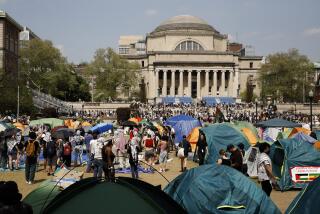NYU Grad Students Keep Up Fight
NEW YORK â In a sign that striking graduate students at New York University may be settling in for a long siege, theyâve sent their rat out for repairs.
Labor groups use the giant inflatable rodent to shame employers they consider guilty of unfair labor practices. NYU earned such treatment, the strikers say, by refusing to negotiate a new contract with the United Auto Workers local that represents the students and by threatening them with the loss of their paid teaching jobs if they continue the strike they launched Nov. 9.
With the ratâs generator motor on the fritz, strikers demonstrating in freezing weather outside the NYU library have had to make do with picket signs, chants and a drum kit with snare and cymbals.
âThe music department has been very supportive,â said Paul Kershaw, a striking teaching assistant in the history department.
The strike has resulted in the cancellation of student-taught classes, as well as other disruptions. Some of NYUâs star professors, including author E.L. Doctorow, have publicly supported the strike. Sympathetic professors have moved classes off campus to avoid crossing picket lines. One alternative site popular with students is a room in the Chelsea headquarters of the Communist Party USA.
Until the UAW contract expired Aug. 31, NYU was the only private university in the United States with unionized graduate students. Approximately 1,000 candidates for doctoral and masterâs degrees teach classes, grade papers and exams, lead seminars and conduct research for faculty members. For this, they receive free tuition and health benefits, plus annual stipends of at least $19,000, a package that the university values at $50,000 annually.
The university says the clash centers on academic issues such as the administrationâs right to assign teaching assistants as it sees fit. NYU spokesman John Beckman said the UAW agreed in the original contract not to interfere with academic decision-making but then went back on its word, filing a number of grievances over teaching assignments.
The grad students say the issues are purely economic. For example, in several cases, the university reclassified teaching assistants as adjunct professors, a lower-paying designation, according to union activist Susan Valentine, a medieval history scholar. Since the contract expired, she said, NYU also has cut the studentsâ health benefits, imposing higher deductibles and co-pays.
âIf anything, what theyâre doing is a direct danger to academic freedom,â said Valentine, who was bundled up in a parka on a cold afternoon last week as a dozen sign-bearing strikers demonstrated nearby.
Grad students in the University of California system and numerous other public universities are unionized, but their legal status is different. About 30 states, including California, recognize teaching assistants at state universities as public employees and explicitly grant them rights to organize and bargain collectively.
Private universities, like other private employers, fall under federal law and are answerable to the National Labor Relations Board.
The NYU contract was signed in 2001, a year after the NLRB ruled that its grad students had the right to join a union. But last year, in a case involving Brown University, the NLRB reversed itself on a 3-2 vote, finding that teaching assistants were not entitled to unionize because their relationship with the university was predominantly academic, not economic.
NLRB members are appointed by the president, so their views tend to shift from administration to administration.
Citing the Brown decision, NYU says it is under no legal obligation to negotiate with the UAW. Beckman noted that the union rejected a proposal last summer that would have allowed the UAW to continue representing the teaching assistants, but only on economic issues.
Valentine said the proposal was rejected in part because it would have required contract disputes to be arbitrated by the office of the university provost, which she said would have unfairly tilted things in the administrationâs favor.
The university set a Dec. 5 deadline for the strikers to resume their duties or face loss of their stipends and teaching posts. NYU said even the holdouts would continue to receive free tuition and health benefits, plus loans to make up for their loss of stipends. The administration said three-quarters of the teaching assistants have returned to class, a figure that the strikers consider inflated.
The university has so far held off on imposing sanctions, as several settlement proposals have surfaced from faculty members, and the administration wants to consider them, spokesman Josh Taylor said Saturday.
But Valentine said Saturday that the proposals were unacceptable because they would require the students to drop UAW representation.
Other private universities were watching the situation closely, said Richard W. Hurd, a professor of industrial and labor relations at Cornell University. Besides NYU and Brown, grad students have been trying to organize at nearby Columbia and Yale universities.
âA win at NYU would certainly create some energyâ in the grad student unionization movement, Hurd said.
But at the same time, because of the lack of clear legal support, organizing grad students at private universities âis a high-risk investment for unions,â he said. âIf the law is going to get in the way, unions might be better off spending their resources on campaigns where there is legal protection.â
Meanwhile, NYU spokesman Taylor mused that the generator for the inflatable rat probably requires a lot of gasoline. If the strike is going to continue, he said, âmaybe they should look into a hybrid rat.â
More to Read
Sign up for Essential California
The most important California stories and recommendations in your inbox every morning.
You may occasionally receive promotional content from the Los Angeles Times.










